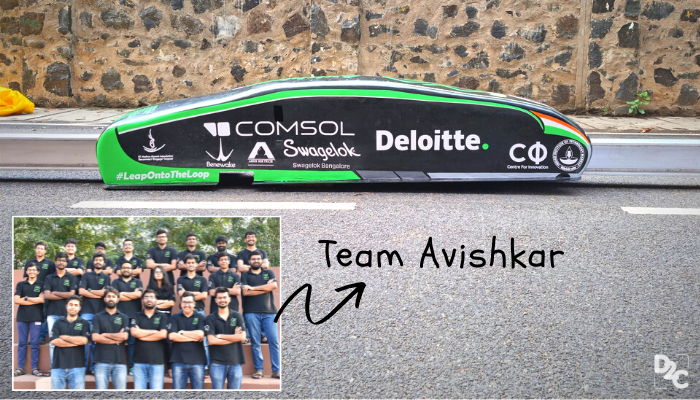IIT Madras students develop hyperloop pod that can travel as fast as 1000km/hour; team qualifies for the European Hyperloop Week!

The whole world is familiar with the four basic modes of transportation - airways, railways, roadways, and waterways that were envisioned, worked upon, and gifted to mankind as early as the 17th and 18th centuries.
Now, think up an image of yourself listening to your favorite songs on loop, comfortably sitting inside a bus-shaped pod that can travel as fast as 1000km/hour running inside a vacuum tube connecting two metropolises. Delighted, stupefied, or both?
Though it might sound like one of the scenes from some of the top-rated sci-fi movies that are based on highly tech-savvy societies, this plausible fifth-mode of transportation is prominently known as Hyperloop. An American billionaire and the brain behind SpaceX and Tesla-Elon Musk proposed the idea of a 'space pod' back in 2013.
From that point forward, several teams of engineers, designers, and governments from across the globe have been investigating thoughts and chipping away at models that endeavor to carry this cutting-edge idea nearer to the real world.
Working on similar lines, Team Avishkar - a group of 40 understudies of IIT Madras has fostered the model of a Hyperloop unit as a part of their submission at a worldwide competition in Spain. Planning to accomplish a speed of 1,000 km each hour, the students pursued making the case solar-powered, budget-friendly, economical, and sustainable.
The whys and the hows of the hyperloop project
In 2019, team 'Avishkar' participated in the SpaceX Hyperloop Pod Competition, a global competition spearheaded by SpaceX, an American manufacturer in the aerospace and aviation domain. It was the only Asian team to have set foot in the finale of the contest. IIT Madras team 'Avishkar' had bagged the top 21 spot out of a total of 1,600 global teams partaking in this challenge.
- Since then the team has picked up the pace and has been constantly working on improvising their model. In these two years, despite the setbacks faced due to the COVID-19 pandemic, they have made swift progress on their prototype and have introduced several innovative changes in their initial model.
- The Covid related lockdown had prompted the closure of all educational institutions in the country which have been shut for more than a year now. The unexpected scenario upset both their scholastics and work on the 'Pod' Prototype.
- As college classes continued by means of the virtual mode, their work on the unit likewise took a similar course. The group of forty brilliant undergrads worked online tirelessly, via video conferences and on-call discussions, to develop a further plan of action for the advancement of its initial prototype.
"Our 2019 vehicle was a basic model and closely resembled a fundamental E-vehicle. We changed and adjusted every one of the eight subsystems on it. The key changes have been made in the impetus and stopping mechanisms of the pod. We introduced more battery packs on this one and additionally fostered our own DC-AC inverter" revealed Neel Balar, a member of team Avishkar.
Changes that led pod into the European Hyperloop Week
Hyperloop innovation is based on the concept of 'Magnetic levitation'. The only addition is that it requires complex hardware and sensors to make a 'Pod' travel inside a vacuum tube at a super speed of almost1000 km/hr.
The team mentions that the planning, design, drafting - 3D modeling, simulation, and software programming were completely done at the respective homes of the students. In the wake of getting back to grounds at IIT Madras, they scarcely had three and a half months to deal with the assembling and manufacturing tasks.
With continuous dedication, diligence, and hard work, team Avishkar finally achieved its mission. The team has named its pod 'Garv' and rightfully so, as it's indeed a matter of immense pride for the country.
- The pod's construction comprises a Carbon Fiber shell loaded with cutting-edge apparatus and sensors. Pranit, who is Head of Braking Module, said that Garv is their second Pod which is more proficient and lighter than the one they intended for SpaceX.
- For their upcoming endeavor, team Avishkar introduced some latest technological advances in its model - such as a linear induction motor to accomplish 'contactless impetus' and 'contactless braking mechanism'.
- The engine sets up a strong magnetic field that propels the pod ahead. The contactless braking has magnets that come in the vicinity of the rail-generating braking power that causes the pod to decelerate.
For starters, Avishkar Hyperloop is a team formulated by several young minds from the Center For Innovation (CFI), IIT Madras, which is chipping away at a native plan and advancement of a self-impelled, completely autonomous Hyperloop Pod in India.
The indigenous team is working with a dream to foster innovations for futuristic methods of high-velocity long-distance transportation, with applications in a range of fields including Defense, Logistics, and Aerospace Industry, among others.
What is the European Hyperloop Week all about?
The understudies' persistent effort has empowered Team Avishkar Hyperloop to meet all requirements for the European Hyperloop Week, being held in Valencia, Spain, from 19 to 25 July 2021. Owing to the travel-related limitations due to the COVID-19 pandemic, the team will partake virtually in the competition.
- The European Hyperloop Week is not merely a competition, it is a holistic intersection of understudy groups, technopreneurs, start-ups, and other organizations diligently working towards making the concept of Hyperloop a reality.
- It will serve as a hotspot for conversations on the dependability, versatility, and possibility of this future innovation.
The competition is being coordinated by four notable European understudy groups in a fruitful collaboration with organizations like Virgin Hyperloop and AECOM.
(The videos are sourced from the official channel of Avishkar Hyperloop)
You may be interested in reading:
- The secret to crack case competitions revealed by the girl who aced L’Oréal Brandstorm, Myntra Stylebiz, Vodafone_VOIS, and Godrej LOUD
- ITC crorepati club | 153 managers drew a salary of over a crore this fiscal year, the highest in India!
- DU admissions 2021: Get the latest updates on CUCET, DUET, percentile system, and more
- List of 'paid' state government internship programs you should not miss!
- Top 5 Freelance Artificial Intelligence jobs to watch out for in 2021
Login to continue reading
And access exclusive content, personalized recommendations, and career-boosting opportunities.
















Comments
Add comment